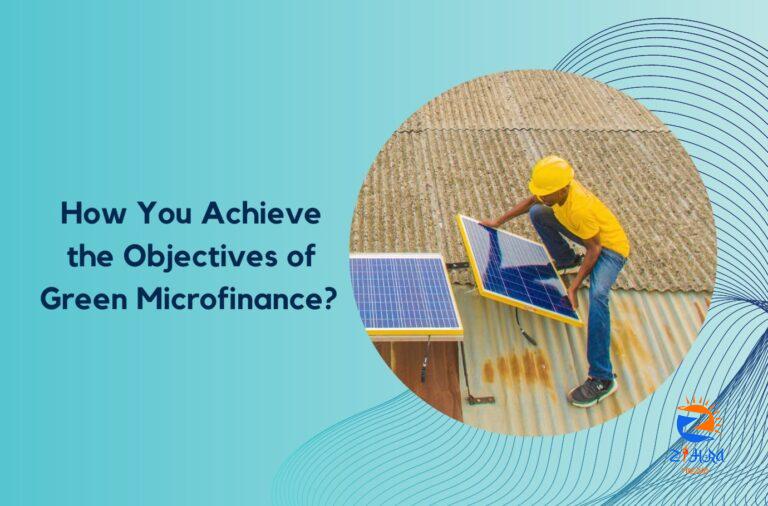
[ad_1]
Until now, Microfinance Institutions (MFIs) had two main objectives: financial inclusion and social development. Simply put, they wanted to get people out of poverty which is a very difficult yet necessary task.
With Microfinance institutions, many countries had a very good positive impact and continue to impact. But it is not enough because a new emergency needs to be taken care of. You might guess that we are talking about environmental sustainability. So, it is green microfinance that must produce a positive impact on the environment.
However, it is not an easy task to handle, but don’t worry; we will tell you how you get it right. Before that, let us tell you what is green microfinance first.
What Is Green Microfinance
Green Microfinance is a model of microfinance that aims for sustainable development through innovative green technology. Especially, it improves the environmental condition by providing sustainable energy solutions. Besides, it also aims to promote organic farming and eradicate the use of chemicals.
Simply put, institutions provide loans to their customers for sustainable projects in green microfinance. They also offer eco-friendly technology as part of their loan scheme. For example, it can be a solar panel, water purifier, loan for organic farming etc.
This model is getting popular worldwide, especially in poor and developing countries. However, Sub-Sharan-Africa is a part where green Microfinance is more popular due to the lack of electricity and necessary technology in remote locations.
On the other hand, in many countries, governments are pushing traditional MFIs to promote sustainable technology and farming. So, those doing it can consider them green microfinance, even if they are just increasing awareness.

How Can Green MFIs Achieve the New Purpose?
An institution with a vocation for environmental sustainability can act on different fronts:
1. Promote Development of Sustainable Activities
They would serve to finance activities compatible with environmental objectives. For example, activities related to clean energy such as solar panels, waste treatment (compost), organic farming, new technologies, ecotourism, resistant agricultural methods, water purification etc.
2. Limit Financing of Harmful Activities
The aimed new purpose can also be achieved by limiting the financial activities considered harmful to the environment. For example, actions based on using energy sources that pollute the environment, such as coal and kerosine. Other examples can be deforestation, overexploitation of soils, the use of chemical products, and activities harmful to workers’ health.
3. Increase Awareness of Climate Change
Institutions that choose to enter this route must necessarily design a strategy that includes raising customer awareness. Changing the customs of the population and their way of working is not easy. It requires coordination between public and private organizations to deliver information programs.

Collaborate With Responsible People and Organizations
To implement the green Microfinance initiative, you also need the collaboration and support of all the actors involved in Microfinance, such as investors, politicians, rating agencies, and international cooperation agencies.
Investors
Microfinance is of interest to socially responsible investors, and the protection of the environment can be an additional positive aspect of their financing criteria. So, it is better to inform them about the issue and make them invest in sustainable development projects.
Credit Rating Agencies
If you are trying to do something that helps the environment, you must notify the credit rating agencies with your balance sheet. The triple line of results – economic, social and environmental – so that the rating agencies can consider this and may further implement the new aspect for all other MFIs.
Regulatory Bodies
Governments are becoming concerned about climate change and trying to enforce environmental standards in all industries. So, it is your responsibility to notify your government to implement sustainable standards in every microfinance. Who knows, you may become the government’s frontier or model to promote environmentally friendly technologies and practices in your area.

How Technology Can Help Achieve the Objectives of Green Microfinance
We have already told you that it is not easy to manage a Microfinance organization. From borrower evaluation to loan disbursement, you have a lot of work. But things get a little more complex when it comes to Green Microfinance.
Before you execute your green initiative, you need to do market and customer research. And this is the only way you can devise a proper plan. Since this type of institution encounters many challenges, it is better to be prepared.
But don’t worry; one good microfinance or Core banking solution can help you achieve your objectives. Though the software cannot work on its own, with proper data, it can help you integrate your green initiative. On the other hand, automation of your microfinance will reduce the cost of operation and the risk of bad debt.
Therefore, if you are planning to start green microfinance or struggling to run one, a microfinance solution can help you get things right and drive profit.
To conclude, green microfinance is a great MFI model that aims to improve the environment by providing eco-friendly technology. But it is often tough to execute and manage. However, necessary technology solutions like MFI software can help you achieve your objectives.
Looking for the Right Technology for Green Microfinance?
Explore Southtech’s Ascend Financials
[ad_2]